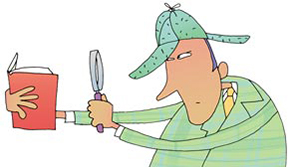Warm-Up for Reading and Writing Literature Assessments
Reading lets you experience great stories, and writing helps you tell your own great stories. That's why some major assessments test your ability to read literature, write about it, and maybe even write your own stories.
What Is Literature Assessment?

Literature assessments test how well you read stories and poems and whether you can write clearly about them. On some literature assessments, you will create your own stories. This unit will help you prepare for these kinds of assessments.
In the following activities, you’ll learn about close reading—reading to understand how a story or poem works. You’ll discover how writers use character, setting, plot, conflict, and theme to develop stories. You’ll also learn how poets use rhythm, rhyme, imagery, and figures of speech. Then you’ll discover strategies for on-demand writing—strategies for developing your own ideas during an assessment.
Thinking About Close Reading
To read closely, you need to think about the parts of a story: character, setting, conflict, and theme. Even flash fiction has these elements.
Read closely.
Read the following flash-fiction story and answer the questions. Make a copy of this Google doc or download a Word template.
Worm with a Backbone
By Kerry Jackson
Flippy the Fish had never seen such a fat worm. It just hung there, wriggling under the water. Its pink skin gleamed with morning sunlight, and the flesh puffed up in the most delicious way. What a perfect breakfast! Flippy was just a little blue gill in a big pond, but if he ate enough worms like this, he’d be a big fish in no time. Except there was something weird about this worm. It was curved. It wriggled, yes, but it never unbent. Flippy moved closer and blinked. The worm looked like it had a backbone—a metal backbone curved in a hook shape. Hmm. Who wants to eat metal? Not so delicious after all, Flippy thought. He finned away across the pond, looking for a better breakfast.